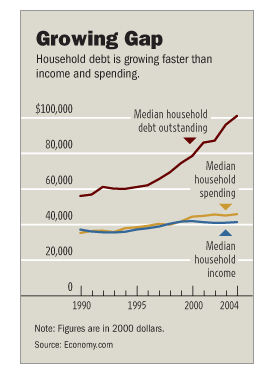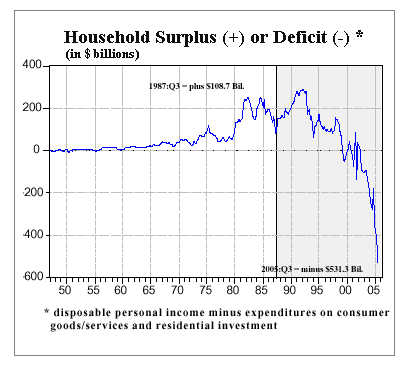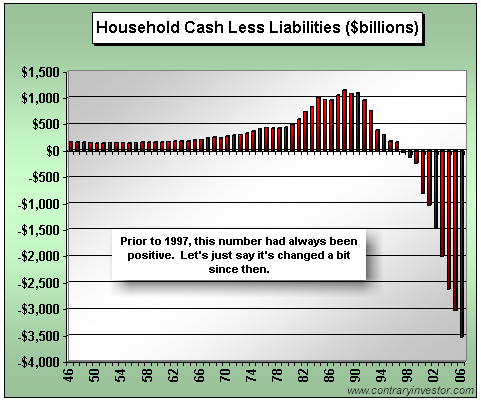

|
| weblog/wEssays archives | home | |
|
Production Versus Consumption: Incentives, Soulless Work and a FIRE Economy (September 27, 2007) I hope you're well-stoked with caffeine, mate, ginger or your stimulant of choice, because we've got another "big ideas" entry today. Frequent contributor Bill Murath kicks things off with a meditation on production versus consumption: (Bill suggested this topic--thank you, Bill) Our degenerate (myself included) society has been fiddled into the easier route of consumption to profit the few. To produce you need years upon years of training etc. The other day a friend sent me an email with huge mansions of the "stars" and the last house pictured was a little shack entitled "mine." I look at the huge estates and think, wow I would love to do the finish trim work in those instead of, I would like to live in them.Correspondent/resource analyst U. Doran sent in a link to a summary of our quandary entitled The Empire of Debt: In 1972, wages reached their peak. According to the U.S. Bureau of Labor Statistics, workers earned $331 a week, in inflation-adjusted 1982 dollars. Since then, itís been a downward slide. Today, real wages are nearly one-fifth lower Ė this, despite real GDP per capita doubling over the same period.  This summarizes the issue I want to explore: the incentives and disencentives which have
been built into our economy.
This summarizes the issue I want to explore: the incentives and disencentives which have
been built into our economy.
People haven't buried themselves in debt because they're stupid--they've acquired ruinous mountains of debt because that's where the incentives and disencentives prodded them. 1. The purchasing power of earned wages has plummeted. Not only have wages shrunk in inflation-corrected terms, but the purchasing power of the U.S. currency has dropped. Real wages have been stagnant since 2000. (see chart, or do a search.) I have addressed this before: Housing Bubble Bust Will Take Down the Global Economy (May 8, 2006) In terms of purchasing power, wage earners have done much worse than flat, thanks to a depreciating dollar and "real" inflation, which is running at double or triple the phony "official rate" of 2% per annum. 2. In an era of low interest and "easy terms," the incentives to borrow increased even as the incentives to save decreased. We can see on this chart how Americans saved when interest rates and wages were higher, and abruptly began borrowing (and spending) prodigious amounts of money when interest rates dropped and wages sank.  Does anyone actually care about the size of the debt they assume any more? No--the number
which is presented and which figures into their calculation of "affordability" is
"the monthly nut"--the monthly payment.
Does anyone actually care about the size of the debt they assume any more? No--the number
which is presented and which figures into their calculation of "affordability" is
"the monthly nut"--the monthly payment.
3. The government actively reduces the incentives to produce (via high tax rates) and increases the incentives to generate income from rents and anything that qualifies for long-term capital gains. Hedge funds went ballistic earlier this year when their lapdogs in Congress had the unmitigated gall to hesitantly suggest hedgies shouldn't be paying the low 15% rate on their outrageous gains, but the rate the great unwashed wage earners pay, i.e. 35%. Hedge funders screamed bloody murder, as if the entire U.S. economy would go to the dogs if they were taxed like the poor underclass who work for a living. If you skim off $100,000 on Schedule D (income from investments) for securities you've owned a year or longer, you pay only $15,000. The taxpayer who earned $100,000 as salary, in contrast, pays $35,000 (I know, they have deductions, but you get the point) and FICA (Social Security) and Medicare taxes, neither of which are paid on capital gains. If you receive net rental income from property (Schedule E), you also pay no FICA or Medicare taxes. But if you have a small business, not only are you taxed at the highest rates, but you pay 15% FICA (both the employer and employee shares). Sure, you get a few other deductions, but if you are successful, you are paying a much higher total tax load than the taxpayer who earns only capital gains and/or rental income. 4. Wealthy Americans have a direct avenue to high returns: hedge funds. Hedge funds, the money managers for the super-rich, numbered 500 companies in 1990, managing $38 billion in assets. Now there are more than 6,000 hedge firms handling more than $1 trillion dollars in assets. (source: "Empire of Debt" link above)The average schmoe doesn't have enough capital to qualify to invest their meager savings with a hedge fund (yeah, schmoes like me), so the wealthy have reaped returns of up to 40% per year while the salaried person might earn 10% if they're lucky in a mutual fund. (Average fund returns historically run about 7%. On occasion some narrow-focused funds do much better, but you have to nimbly enter and exit these small funds to reap 20%+ gains.) Yes, hedge funds have higher risks--the reason given for restricting Joe Salaryman from investing. But this is ethically flawed. If Joe Salaryman wants to invest say 20% of his savings in a high-risk hedge fund in hopes of earning outsized returns, why shouldn't he be allowed to make that choice? OK, limit his investment-at-risk to a sum smaller than his liquid assets, but don't preclude him from taking on higher risks and returns. 5. As a result of these limited options for wealth-building and declining real wages, average Americans jumped on the housing bubble wealth-creation ride. Your salary/wages are actually falling every year, and yet you see rich folks making money from rising assets: vintage wines, hedge fund shares, property, paintings, precious metals, you name it. What do you do? Let's face it: many of these assets are out of the average Americans' reach and/or expertise. But housing is something everyone can understand. So you invest in something "safe" that you understand: housing. The results of this desire to reap investment returns in a low interest-rate environment can be seen in these two charts: 

6. As noted elsewhere, the U.S. economy has become a FIRE (finance, insurance, real estate) economy of service jobs. Yes, the U.S. is still a mighty producer of agricultural goods, aircraft, autos, biotechnology, chemicals and high technology, but in terms of jobs only about 15% are classified as manufacturing/farming. 7. The U.S. is falling behind in manufacturing technologies with future growth possibilities. This is a real "which part of the elephant are you touching?" subject. Cheerleaders for the U.S. point to the high government support for basic research and the billions in private venture capital flowing into new start-ups in Silicon Valley and elsewhere. Nice, but meanwhile, over on another part of the elephant, Toyota just sold its millionth hybrid vehicle in the U.S., a market the U.S. manufacturers wrote off as "unprofitable due to low demand." And as knowledgeable reader Tom S. noted recently, most of the photovoltaic panels being purchased via government subsidies in the U.S. are manufactured in Japan or Germany--nations with strong national focuses on alternative energy and energy conservation technologies. This begs the question: if the U.S. market has been crippled by disincentives to make actual products and incentives to produce nothing but financial transactions, will "the market" be able to suddenly re-energize the U.S. manufacturing base? Cheerleaders point to the plummeting dollar and proudly predict that overseas buyers will soon be snapping up "cheap U.S.-made goods" because the sagging dollar has lowered the cost of U.S.-made goods in other currencies. Never mind that inflation will roar up as imported goods skyrocket in cost, and the sad fact that the U.S. citizen's purchasing power will plummet along with their currency-- there's another problem. What if there isn't much made here anymore? Yes, let's grant Boeing, soybeans, almonds, Hollywood, Catepillar, Citicorp and Microsoft their well-earned glory: the U.S. sells $1 trillion in goods and services abroad: that's 7.5% of the GDP. But the U.S. imports $1.8 trillion. So the question becomes: can our exporting stalwarts sell $800 billion more a year? And if they can't, then what U.S. goods and services will appear that overseas buyers want? If we've removed the incentives to producing actual goods, then perhaps the answer will be: there won't be any meaningful resurgence in exports. 8. The FIRE economy is non-productive. It should be called the GFIRE economy, G for government. Taking my cousins and their spouses as a non-scientific sampling of the U.S. workforce, we find a disproportionate share of government workers. Of 14 cousins/working spouses, 7 work for government agencies. Two work in real estate/building, one in sports, one in law, and one in insurance. Only my brother and I are self-employed (own small businesses), and he lives in France--another country which relegates small business owners to a life of tax-and-fee penury and grinding bureaucratic nonsense. Who's actually producing any goods and services to support all these government jobs and paper-shuffling jobs in insurance and real estate? Those of you who are self-employed or own small businesses--you know the score. The disincentives to start or operate a small business in the U.S. are huge and growing heavier by the day. 9. The GFIRE economy depends entirely on the repetition and velocity of transactions to survive. If you don't buy a lot of stuff with your credit cards, nobody makes money. If you don't re-fi your mortgage, HELOC or other loans every few years, nobody makes money. If you "buy and hold" a stock and don't churn your portfolio with lots of buying and selling, nobody makes money. If you don't take handfuls of "it doesn't work but what the heck, I have to prescribe something" pharmaceuticals, nobody makes money. If you don't go to the doctor often, nobody makes money. If you don't buy a new car every few years (with a new loan), nobody makes money. If you don't have insurance, nobody makes money. I think you get the picture. Without ever-increasing volumes of financial transactions, the GFIRE economy stops breathing and dies. 9. The quintessential corporate-America success story is Apple, which makes nothing in the U.S. How much of the U.S.-based global companies' goods and services--you know the roster, Coke, IBM, 3M, Proctor & Gamble, etc.--are actually made in the U.S.? Judging by the fact that overseas markets account for more than 50% of their sales and profits, you have to wonder if their sales should even be included in the U.S. GDP. What would the U.S. GDP be if only goods and services actually produced in the U.S. were counted? 10. Essentially non-productive digital-data-massaging jobs are soul-deadening tasks which alienate the workers from the real world. As long-time readers know, I have more than a passing knowledge of Marxism via my useless degree in philosophy. (I also have equally useless knowledge of Taoism and other have-no-financial-value topics. Yes, I am an idiot!) Marx rather famously observed that the worker in a capitalist economy was alienated (philosophic bonus word: reified) from the results of their work. Add to this the pressure to make up falling wages with risky investment gambles and the brainwashing effects of "24/7 advertising and marketing, all the time, in all mediums and all places" and you reach where we are today. I would suggest that these forces have reached their zenith in our "information (digital-data-massaging) technology" age. Although it may seem like a stretch, I also discern the roots of our culture's ill-health (can't/won't cook, won't exercise, wants instant pill solutions, needs drugs to sleep, needs drugs to ward off depression and anxiety, etc.) and soulless obsession with consumption in this fundamental disconnect between the real world of growing and preparing food (no, not the Food Channel, actually working with fresh food), of making real objects of real utility, of caring about one's work and knowing it has value, and the GFIRE economy of shuffling paper and its digital equivalents, feeding a great machine with more and more transactions with little or no intrinsic value. Oh, and the stock markets are up today on all the good news. And "markets" never lie, do they? Thank you, James C., ($30) for your generous donation to this humble site. I am greatly honored by your contribution and readership. All contributors are listed below in acknowledgement of my gratitude. For more on this subject and a wide array of other topics, please visit my weblog. copyright © 2007 Charles Hugh Smith. All rights reserved in all media. I would be honored if you linked this wEssay to your site, or printed a copy for your own use. |
||
| weblog/wEssays | home |